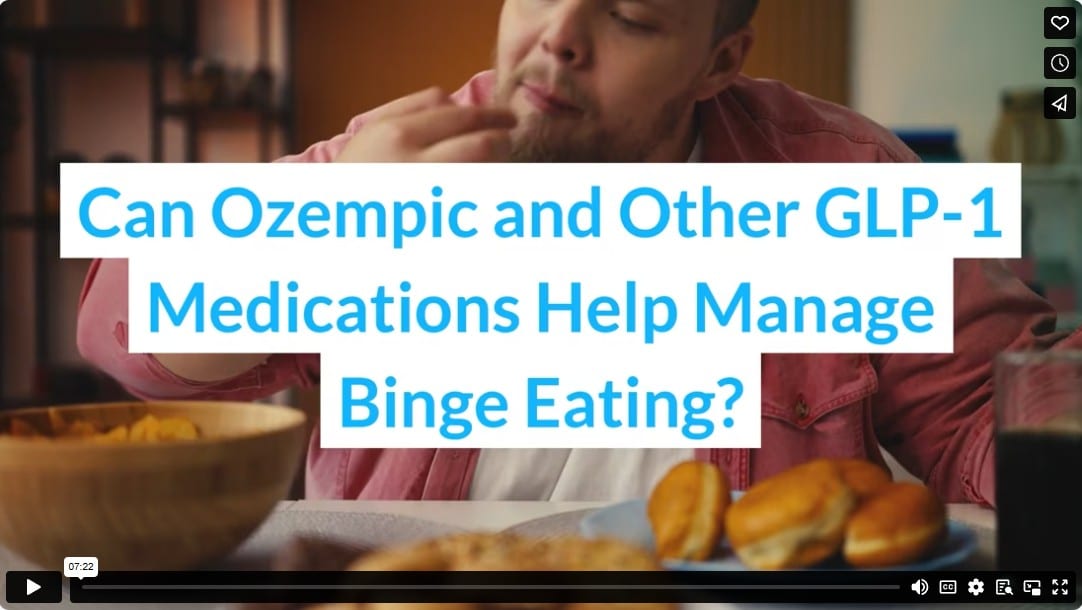Can Ozempic and Other GLP-1 Medications Help Manage Binge Eating?

If you’ve ever felt like you’ve lost control around food, eating far beyond fullness and feeling powerless to stop, you’re not alone.
Binge Eating Disorder (BED) is the most common eating disorder in the United States, and it’s more than just occasional overeating. It’s often driven by a mix of emotional, psychological, and physiological triggers and leaves you feeling ashamed and physically uncomfortable.
Unlike bulimia, BED doesn’t include purging behaviors. Instead, you might find yourself eating large quantities of food in secret, feeling out of control during these episodes, and then stuck in a cycle of restriction and guilt that spins like a hamster wheel you can’t quite jump off.
The physical consequences can be serious, including weight gain, insulin resistance, and even type 2 diabetes, but the emotional weight is just as damaging.
You may have tried diets or strict food rules, only to fall back into the same patterns. That’s because binge eating isn’t simply about a lack of discipline. It’s a complex condition that may respond better to biological interventions. That’s where GLP-1 prescription weight loss meds come into the picture.
What Are GLP-1 Medications Like Ozempic?
GLP-1 (glucagon-like peptide-1) medications were initially developed to help manage type 2 diabetes. You’ve probably heard the names Ozempic, Wegovy, and Mounjaro by now. All three of these medications belong to this class.
These drugs mimic a hormone your body naturally produces in the gut that regulates appetite, insulin production, and how quickly your stomach empties. When you take a GLP-1 medication, it slows down digestion and helps you feel full longer. Think of it like installing new brakes on a runaway hunger train.
A GLP-1 medication also acts on areas of your brain responsible for hunger and reward, meaning it may significantly reduce those intense food cravings and compulsions. In many cases, people report a decreased interest in food, eating smaller portions, and feeling greater control over their eating habits without needing Herculean willpower.
This isn’t a crash diet or a stimulant that artificially suppresses appetite; it’s a biologically informed treatment that can change how you relate to food.
The Science Linking GLP-1s and Binge Eating
Emerging research is starting to validate what some patients have already experienced: GLP-1 medications may help reduce binge eating behaviors. Studies have found that drugs like liraglutide (Saxenda) and semaglutide (Ozempic and Wegovy) lead to fewer binge episodes, reduced cravings, and improved emotional regulation around food.1
You may wonder how exactly this works. GLP-1s target brain receptors involved in reward and impulse control, particularly in regions like the hypothalamus and the mesolimbic dopamine system. These are the brain’s pleasure hotspots, the same areas that light up when you crave a double chocolate cake or reach for that snack during a stressful day.
By calming down these reward pathways, GLP-1s help hit pause between the craving and the behavior. Instead of reacting on autopilot to a trigger with food, you gain space to choose something different, whether that’s a walk, a phone call, or just taking a moment to breathe.
And since binge eating often involves rapid food consumption without true hunger, slowing gastric emptying gives your body time to send the “I’m full!” memo loud and clear before you overdo it.
How You Might Feel on a GLP-1 Medication
If you’re considering a medication like Ozempic to help with binge eating, know what to expect, not just physically, but mentally. Many people describe a significant reduction in “food noise.” That constant mental chatter about what to eat next, how much to allow yourself, or how to “make up” for a binge starts dialing down the volume.
You may naturally turn away from foods that once felt irresistible, without needing to battle yourself to make the “right” choice. Meals become simpler. Hunger becomes less urgent. Emotional distress stops acting like a VIP pass to the pantry.
This shift can be incredibly freeing, especially if you’ve spent years trapped in obsessive food thoughts. While no medication is a magic bullet, people who order weight loss injections online often create enough distance from their compulsive urges to be able to practice new, healthier habits.
A Supportive Role in a Larger Treatment Plan
GLP-1 medications are not standalone solutions. They’re most effective alongside therapy, behavioral interventions, and supportive lifestyle changes. If you’re working with a therapist, especially one trained in eating disorders, combining sessions with GLP-1 treatment can unlock doors to deeper breakthroughs.
Cognitive-behavioral therapy (CBT), intuitive eating principles, and emotion regulation skills become more accessible when you’re not constantly derailed by overwhelming hunger or shame from a recent binge. You can focus on the emotional work without food yanking you back into survival mode.
Think of the medication as scaffolding that supports you while you do the work to build something lasting like moving your body and eating nutritious meals. With time, you may find that your relationship with food becomes more balanced, more forgiving, and less emotionally charged, a far cry from the rollercoaster it once was.
Are You a Candidate for GLP-1 Treatment?
While GLP-1s were initially approved for diabetes and later for obesity, many providers are now using them off-label to help with disordered eating behaviors. If you struggle with binge eating and have a history of weight-related health issues, you may be a good candidate.
You’ll want to speak with a provider who understands the metabolic and psychological aspects of eating behavior. Be honest about your history with food, emotional triggers, and previous attempts at weight loss or binge control. The more complete your picture, the better your provider can tailor an affordable Ozempic for weight loss plan that includes medication, therapy, and support.
It’s also important to manage expectations. You won’t lose your appetite entirely. The goal isn’t to avoid food. Instead, GLP-1s should make food feel less overwhelming, helping you build a more peaceful, harmonious relationship with eating. Less battle, more balance.
Common Concerns and Side Effects
Every medication has potential side effects, and GLP-1s are no exception. The most common are gastrointestinal, like nausea, bloating, or mild discomfort, especially in the first few weeks. These symptoms usually ease over time and can be managed by starting at a low dose and increasing gradually.
You might also notice that your body becomes more sensitive to rich or greasy foods. Many people naturally gravitate toward lighter meals and smaller portions. Your appetite is developing a new taste for the finer and easier-to-digest things in life. This change can be a positive shift towards eating less but still nourishing yourself adequately.
Stay connected with your provider, especially if you’ve had a complicated relationship with food. The goal is not to trade binge eating for restrictive tendencies. The goal is to move toward balance and stability, kind of like finding that sweet spot on a playground seesaw.
A New Path Toward Food Freedom
If binge eating has felt like a relentless storm, tossing you between shame and frustration, there’s hope. GLP-1 medications like Ozempic offer a new pathway rooted in neuroscience, not willpower. They won’t erase the emotional roots of disordered eating, but they can carve out breathing room to begin addressing them head-on.
You deserve a relationship with food that feels calm, consistent, and free from guilt. With the right support, including medical treatment, therapy, and self-compassion, you can step off the rollercoaster and onto steady ground.
Video

Infographic
Many try diets or strict food rules, only to revert to old habits. Binge eating is a complex condition that often requires biological interventions. That’s where GLP-1 prescription weight loss medications come in. Explore this infographic to learn more.
1https://www.sciencedirect.com/science/article/pii/S2214623724000048#:~:text=Highlights,of%20GLP%2D1RAs%20on%20BEB.



